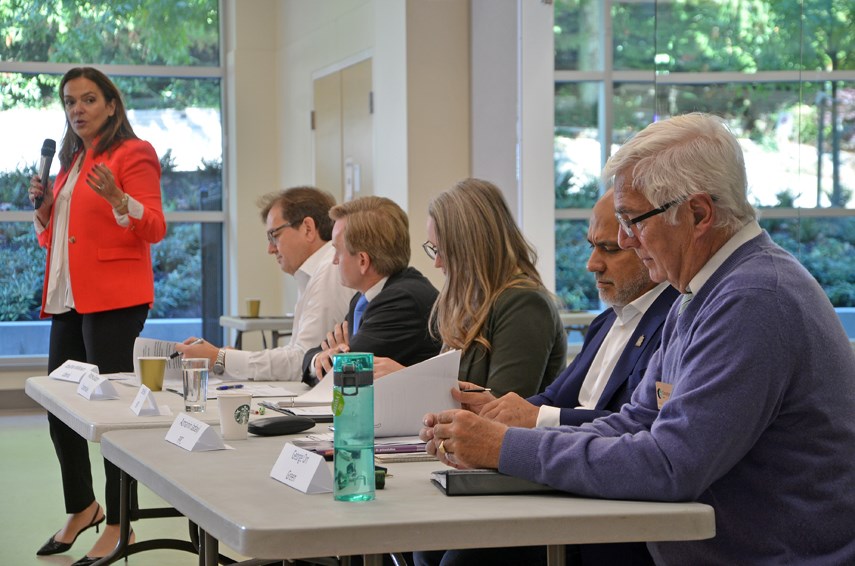While topics ranged from immigration and health care, to salmon farming and Canada-Iran relations, it was the environment that mainly took centre stage during a debate between North Vancouver candidates Saturday afternoon.
Five federal election candidates took part in the event held at Delbrook rec centre, which was organized by the Civic Association of Iranian Canadians.
“My party’s not going to meet the Paris [Agreement] targets – we’re going to double the Paris targets,” said Green Party candidate George Orr, referring to Canada’s 2015 commitment to reduce its annual greenhouse gas emissions to 30 per cent below 2005 levels by 2030. “We need to stop selling gasoline cars by 2030, we need to be off carbon entirely by 2050.”
Citing last week’s Global Climate Strike that saw more than 100,000 people descend on Vancouver in protest of government inaction on the climate crisis, NDP candidate Justine Bell said she had spoken with many young people who had expressed their trepidations for the future due to a worsening environment.
“It needs to be addressed in a holistic manner here in Canada and around the world,” said Bell, touting her party’s promise of implementing a Canadian green new deal which would attempt to spur economic growth through green investments.
According to Bell, the NDP would end subsidies to oil and gas companies and “heavily invest into the green and clean technology and infrastructure of the future” which would “create those good jobs.”
Noting his conversations with voters while on the campaign trail, Conservative Party candidate Andrew Saxton said that climate change was the No. 1 issue that North Vancouver residents were concerned about.
Saxton, who was North Vancouver’s member of Parliament from 2008 to 2015, said Canada’s climate plan should prioritize a global impact, which could be achieved by focusing on exporting green technologies to countries known to be big polluters in an effort to lower their output of greenhouse gas emissions.
“We believe that Canada can be a world leader in green technology,” said Saxton. “If we’re going to hit above our weight, we have to take our technologies to those countries that are the large emitters, like India, China and the United States.”
Azmairnin Jadavji, representing the People’s Party of Canada, said it was “vain” to think that Canada could make a difference regarding the climate crisis. “I believe in the future of technology and the future of humankind to mitigate against climate change – instead of taxing us.”
Liberal incumbent Jonathan Wilkinson, noting in his role as fisheries minister that one of the major issues affecting wild salmon has been the impacts of climate change, defended the government’s environmental record.
“We have made the commitment to net-zero by 2050,” said Wilkinson. “We need to target the demand for oil that exists around the world, that is primarily transportation, and that means moving towards an electric vehicle infrastructure here and helping other countries around the world make that transition,” said Wilkinson.
While admitting that the government’s decision to purchase the Trans Mountain pipeline had been controversial, he said that moving forward with the project would not hinder Canada’s ability to meet the targets outlined in the Paris Agreement.
Concerning the Trans Mountain pipeline, Saxton said the first thing a Conservative government would do is sell it because: “no government should own a pipeline.”
Bell said voting for a NDP MP would result in electing someone who would fight against the pipeline, while Orr said if he was elected he would do everything in his power to stop its construction.
The People’s Party would proceed with the Trans Mountain pipeline because Canada is “a resource-rich country” and the project involves shipping resources which would benefit the economy, according to Jadavji.
Following a brief recess, candidates were asked who among them had marched in last week’s Global Climate Strike, with three of the five candidates – Bell, Orr and Wilkinson – raising their hands affirmatively.
The federal election is scheduled for Oct. 21.



